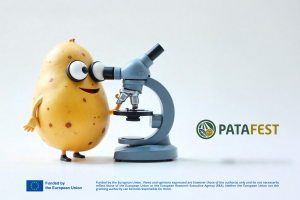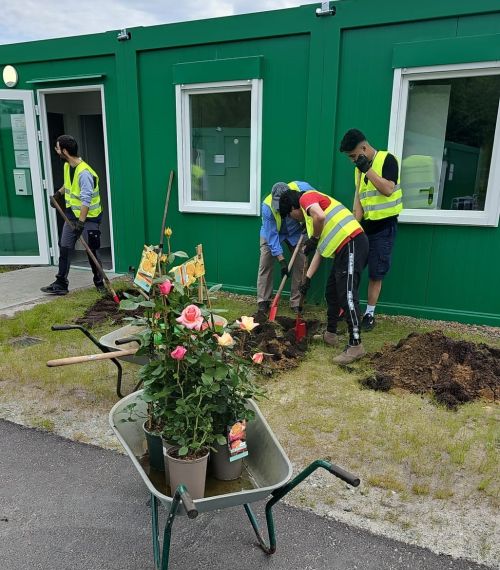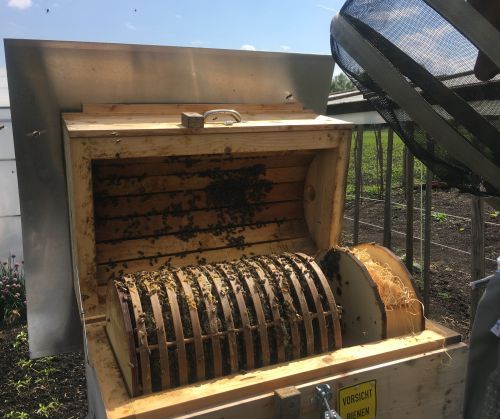-DE -
Um einen Einblick in die Welt der Kartoffelforschung zu geben, lädt ECSA Kartoffelanbauende ins Naturkundemuseum ein, um ihre eigenen Kartoffelblätter zur DNA-Analyse mitzubringen und sie auf krankheitsresistente Gene zu untersuchen. Krankheiten, wie Kartoffelfäule, Colletotrichum-Welkekrankheit und Silberschorf sind Fokus im EU-geförderten PataFEST Projekt. Gemeinsam mit dem Team aus dem Labor werden die unterschiedlichen Stufen einer DNA Analyse erklärt und durchgeführt: Isolierung der DNA, Quanitfizierung, PCR und DNA Sequenzierung.
Neugierig geworden? Dann schreibt uns unter: Diese E-Mail-Adresse ist vor Spambots geschützt! Zur Anzeige muss JavaScript eingeschaltet sein! oder meldet euch hier an: https://forms.gle/nSvXNJ3B8ysnLykd6
-ENG-
Which potato varieties are resistant to dry rot, black dot and silver scurf? These are the different diseases that the PataFEST project deals with. To give an insight into the world of potato research, ECSA, together with the Natural History Museum Berlin, invites potato growers to bring in their own potato leaves. You can then test them for disease resistant genes. Together with the team from the molecular biology lab, the different stages of DNA analysis will be explained and carried out: Isolation of DNA, quantification, PCR and DNA sequencing.
Curious? Then write to us at Diese E-Mail-Adresse ist vor Spambots geschützt! Zur Anzeige muss JavaScript eingeschaltet sein! You can also register here: https://forms.gle/nSvXNJ3B8ysnLykd6
Disclaimer:
Leider können Personen, die schwanger sind, stillen, unter 18 Jahre alt sind oder keine Kartoffeln anbauen, nicht ins Labor. Wir werden einen separaten Stand in der Ausstellungshalle des Museums haben, der für alle zugänglich ist.
Unfortunately, people, who are pregnant, breastfeeding or under the age of 18 cannot enter the lab. We will have a separate booth in the exhibition hall of the museum accessible for everyone.

 Im Ende 2024 eröffneten Containerdorf für Geflüchtete an der Agnes-Karll-Allee in Elmshorn ist ein lebendiger Gemeinschaftsgarten entstanden. Die Gartenarbeiten haben im Mai 2025 begonnen. Viele der...
Im Ende 2024 eröffneten Containerdorf für Geflüchtete an der Agnes-Karll-Allee in Elmshorn ist ein lebendiger Gemeinschaftsgarten entstanden. Die Gartenarbeiten haben im Mai 2025 begonnen. Viele der...
 Der Bayerische Volkshochschulverband organisiert Fortbildungen für Mitarbeiter*innen und Kursleiter*innen von Volkshochschulen. Dieses Jahr hat der Verband das Thema Urban Gardening aufgegriffen. Ziel ist es,...
Der Bayerische Volkshochschulverband organisiert Fortbildungen für Mitarbeiter*innen und Kursleiter*innen von Volkshochschulen. Dieses Jahr hat der Verband das Thema Urban Gardening aufgegriffen. Ziel ist es,...
 Der Wurzelgarten in Dachau ist ein Interkultureller Garten. 36 Pächterfamilien, rund 100 Menschen, nutzen den Garten sehr regelmäßig. Die 2400m² große Fläche wird von einem Landwirt gepachtet und liegt zentral in...
Der Wurzelgarten in Dachau ist ein Interkultureller Garten. 36 Pächterfamilien, rund 100 Menschen, nutzen den Garten sehr regelmäßig. Die 2400m² große Fläche wird von einem Landwirt gepachtet und liegt zentral in...

Neuste Kommentare